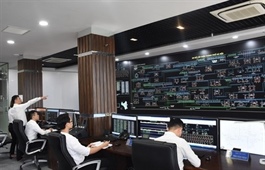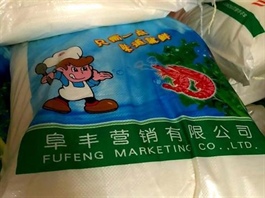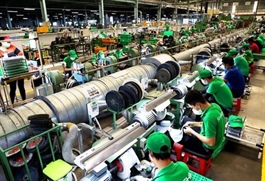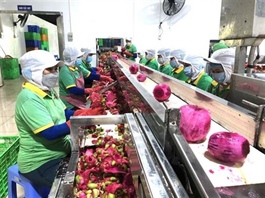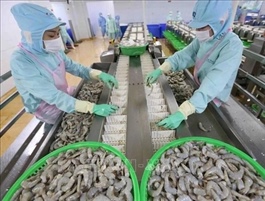EVFTA boosts Vietnamese exports, but EU firms face challenges: EuroCham
EVFTA boosts Vietnamese exports, but EU firms face challenges: EuroCham
As the EU-Vietnam Free Trade Agreement (EVFTA) approaches its fourth anniversary on August 1, 2024, the latest survey by the European Chamber of Commerce in Vietnam (EuroCham) paints a nuanced picture of the pact's impact.
The EuroCham Business Confidence Index (BCI) survey, conducted by Decision Lab, paints a mixed picture of the impact of the EU-Vietnam Free Trade Agreement (EVFTA). While the landmark pact has undoubtedly opened new doors for European businesses in Vietnam, significant hurdles remain.
The survey findings underscore that the EVFTA is a powerful catalyst for economic growth, but its long-term success hinges on the ability to address persistent regulatory complexities, technical barriers, and awareness gaps, according to Thue Quist Thomasen, CEO of Decision Lab.
"A targeted approach to support businesses, particularly SMEs [small and medium enterprises], in navigating these challenges is crucial," he underlined.
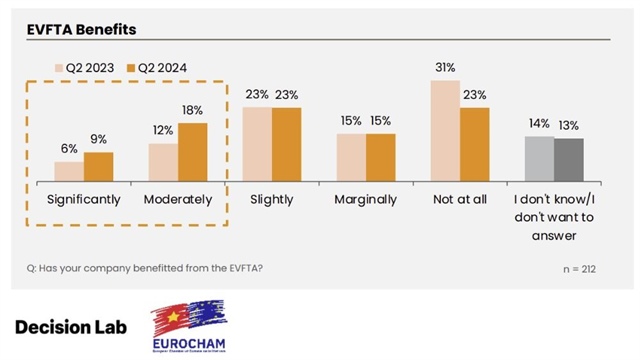
Delegates share their views at a recent event hosted by EuroCham. Photo: EuroCham |
Challenges to overcome
The EuroCham BCI survey highlights the obstacles that European businesses face in taking full advantage of the EVFTA. These include complex regulations, lack of recognition of international standards by local authorities, and insufficient understanding of the agreement among stakeholders. Valuation and customs clearance issues, as well as technical barriers such as certification and product testing, also hamper trade.
"The EVFTA has certainly created new opportunities for European businesses in Vietnam," said Dominik Meichle, Chairman of EuroCham Vietnam. "However, our survey shows that while progress has been made, challenges remain. As we enter the fifth year of the agreement, it is crucial to continue working on simplifying procedures, aligning standards and ensuring that everyone understands how the EVFTA works."
EuroCham Vice Chairman Jean-Jacques Bouflet also noted that recent policy adjustments in Vietnam have created challenges for European businesses operating under the EVFTA.
"These changes, which include new internal and excise taxes and technical barriers to entry, are holding back the full potential of the agreement," he remarked. "However, we are actively engaged in constructive discussions to address these issues and find solutions that benefit both Vietnam and Europe."
Bouflet outlined EuroCham's strategic initiatives to address the identified challenges and maximize the benefits of the EVFTA, adding that EuroCham is committed to working with stakeholders to streamline regulatory compliance, advocate for greater recognition of international standards, and develop comprehensive education and awareness programs on the EVFTA.
“We will also continue to push for solutions to technical barriers to trade, particularly in certification and testing, and advocate for further tariff reductions and streamlined customs procedures,” he said.
EuroCham Vietnam urges full ratification of the EU-Vietnam Investment Protection Agreement (EVIPA) to unlock the full FDI potential of the EVFTA. While the EU institutions have approved the EVIPA, it still requires individual ratification by all 27 EU member states. With 18 states already ratified, EuroCham Vietnam is working with European stakeholders to encourage the remaining states to follow suit.
The Chairman of EuroCham Vietnam reiterated EuroCham's commitment to helping its members take full advantage of the opportunities offered by the EVFTA.
"We will continue to work closely with the Vietnamese authorities to address remaining challenges and ensure that both European and Vietnamese businesses can reap the full benefits of this landmark agreement," he stressed.
Benefits from the EVFTA

Source: EuroCham BCI survey |
The survey shows that while nearly two-thirds of respondents report some level of benefit, the extent of the impact varies widely. Some 27% of companies - up from 18% in 2023 - now enjoy moderate to significant benefits. However, another quarter, down from 31% in 2023, has yet to see any tangible gains.
Despite these differences, EuroCham members unanimously cite tariff reductions, increased market competitiveness and expanded market access as key benefits. Other benefits include streamlined supply chains, improved business transparency and a stronger regulatory framework.
The EVFTA has strengthened Vietnam's position as an attractive destination for European investors. The EU, a major investor, has invested 28 billion euros ($30.3 billion) in 2,450 projects, showing continued confidence. EU investors added 800 million euros ($865.8 million) in FDI from January to September 2023, bucking the global decline in FDI.
The agreement has significantly boosted Vietnam's exports to Europe, which jumped from 35 billion euros ($37.9 billion) in 2019 to more than 48 billion euros ($51.9 billion) in 2023, particularly in electronics, textiles, and agriculture. However, EU exports to Vietnam increased slightly, from 11 billion to 11.4 billion euros ($11.9 billion to $12.3 billion), creating a trade imbalance.
|
The EVFTA, a landmark deal that entered into force four years ago, has become an important catalyst for trade and investment between the European Union and Vietnam. As the only Southeast Asian nation with such a comprehensive agreement with the EU, Vietnam enjoys a significant competitive advantage over its neighbors who are still in the negotiation phase. The EVFTA's ambitious goals of eliminating nearly all tariffs, reducing regulatory hurdles, and cutting red tape have already translated into increased bilateral trade and investment. However, the full potential of the agreement is yet to be realized as both businesses and government agencies navigate the complexities of implementation and adaptation. |




